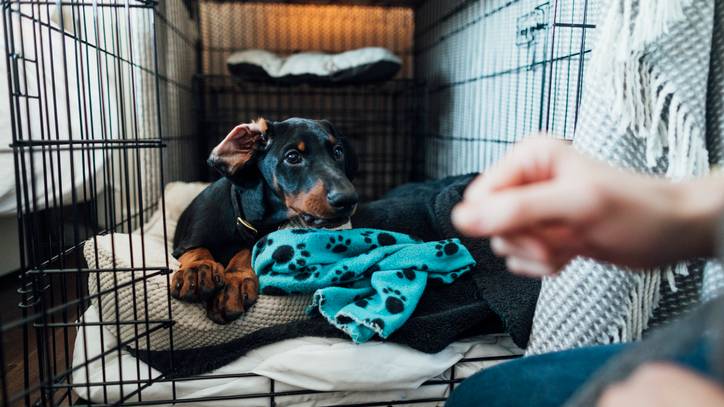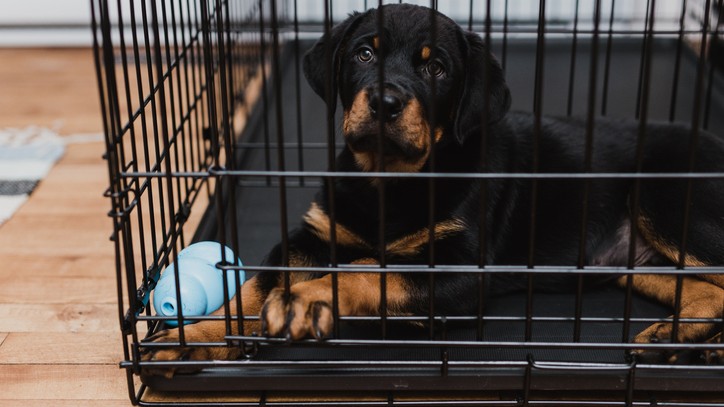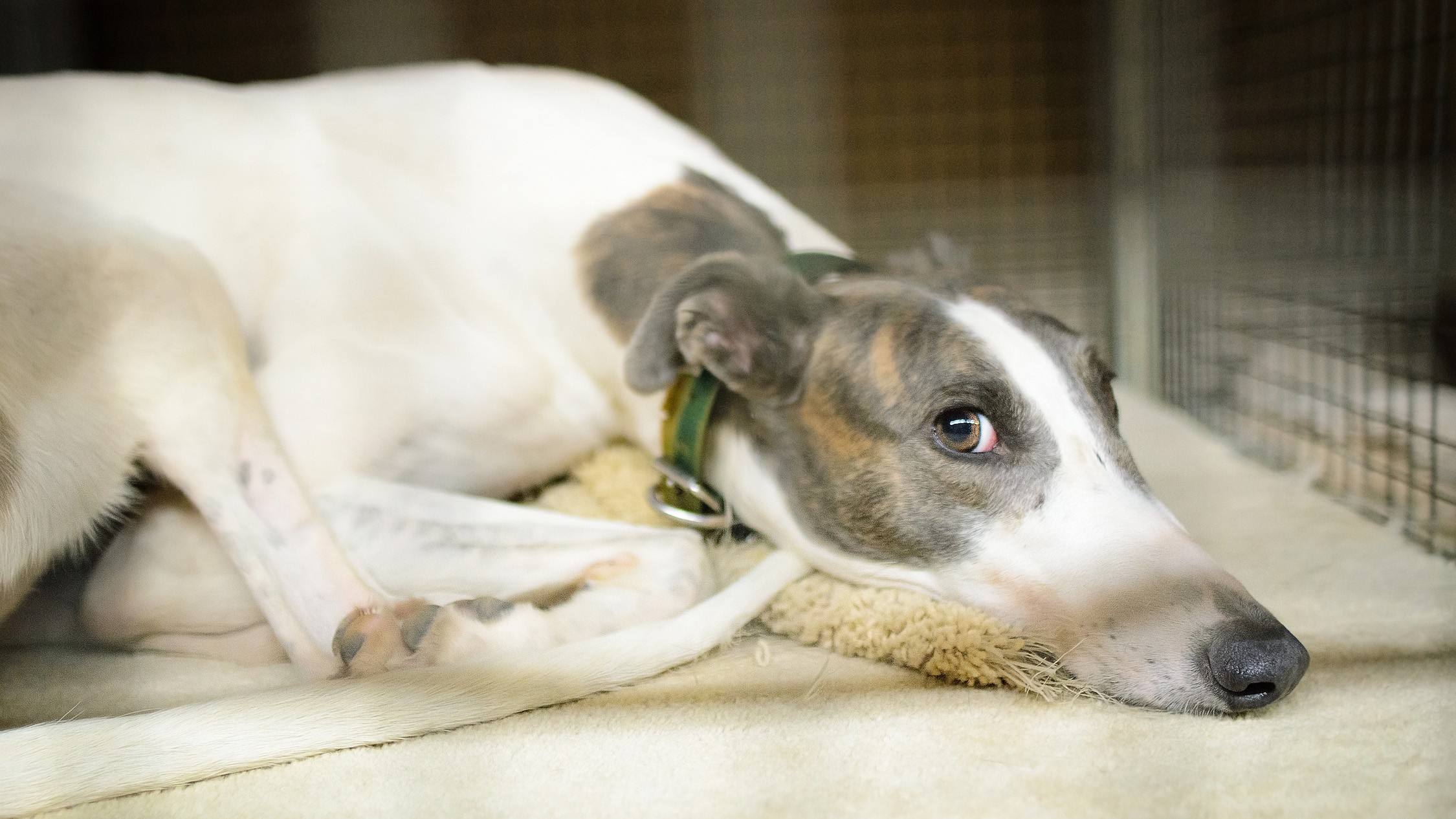How to stop a dog from pooping in the crate
Knowing how to stop a dog from pooping in the crate is an important lesson for anyone who has a pup that hasn’t quite grasped that they can’t use their crate as a toilet

Get the best advice, tips and top tech for your beloved Pets
You are now subscribed
Your newsletter sign-up was successful
Want to know how to stop a dog from pooping in the crate? If you're a dog owner, you know how frustrating it can be to clean up after your pup when they make a mess in their crate - especially when you’ve gone to extra effort to find them the very best dog crate on the market. Not only is it unpleasant, but it's also unhealthy for your pet to be sitting in their own waste. Fortunately, there are steps you can take to stop your dog from pooping in their crate.
First and foremost, it's important to understand why your dog is pooping in their crate. This could be due to a number of reasons, including separation anxiety in dogs, not properly knowing how to crate train a dog, or medical issues. Once you identify the root cause of the problem, you can take appropriate action to prevent it from happening again.
In this article, vet Dr Joanna Woodnutt will take over from us, and provide you with tips and tricks to stop your dog from pooping in their crate. From adjusting their diet and exercise routine to crate training techniques, we'll cover all the bases to help you keep your dog's crate clean and sanitary. So, if you're tired of cleaning up after your furry friend, keep reading to learn how to put an end to the problem once and for all.

Dr Joanna Woodnutt qualified as a veterinarian from the University of Nottingham where she then went on to practice companion animal medicine in the Midlands. She really took to the consulting side of things and helping clients with medical problems such as dermatology, behaviour and nutrition - anything that involved helping clients understand their pets better.
How to stop your dog from pooping in the crate
1. Decide if a crate is right for your dog
Not all dogs can tolerate crates, which is something you should consider when crate training is a topic of conversation. If you have a dog trainer, discuss it with them, as some dogs can get claustrophobic or otherwise anxious when in a crate. Some dogs don't need to be crated when left alone, as they don't have an affinity for chewing stuff they shouldn't or making messes, but always ensure you leave your dog in a safe situation when leaving the house.
Determining whether your dog is a good fit for crate training is something you can do on your own by observing them in a crate, or with a trainer if necessary. Crate training a puppy is far easier than trying to crate train an older dog, as you can help create positive associations with the crate and help teach a puppy bladder control. Older dogs may have negative connotations with the crate, or may fear solitude.
2. Pick the right size crate

"It’s really important not to have too big a crate for your puppy – it should be big enough for your dog’s bed and a bowl of water and that’s it," explains Woodnutt. "The reason is that very few dogs will poop in their bed, so you need to make the whole crate ‘bed’. This may mean buying several crates as your dog grows to ensure each is only just big enough for their bed – or at least until they’ve got the hang of the toilet training thing!"
When shopping for a dog crate, make sure you have your dog's length measurements and weight on hand. This will help determine the right sized crate when matched up against manufacturer's charts.
Get the best advice, tips and top tech for your beloved Pets
3. Rule out any health issues
"If your dog is regularly pooping in his crate you need to differentiate between a training issue and a medical one," says Woodnutt. "Before heading to your vet, try to observe your dog pooping using a camera. Do they know that’s what they’re doing? Are they attempting to signal to be let out? Some medical problems can cause dogs to become incontinent, in which case your dog won’t be aware they’re pooping. Other medical problems cause urgency which mean your dog will know they need to poop, but they won’t get much warning. Identifying if either of these apply to your dog before you take them to the vet will help with the diagnostics."
In terms of mental health, it's important to rule out separation anxiety as a cause for your dog pooping in the crate. Separation anxiety in dogs is a very common condition and something that can make you as a pet parent feel trapped in your own home. If you feel your pup may be struggling with this, we recommend you seek the assistance of a professional dog trainer who will be able to provide you and your pup with some 1:1 support.
4. Make sure you take your dog out before crating them
Learning how to potty train a puppy is one of the most important skills you'll want to master as a pet parent and it's especially key that you take your little one outside at night to relieve themselves.
As the American Kennel Club (AKC ) points out, puppies' bladders aren't fully developed, and it's difficult for them to hold their urine in all night long. If they have pee instances in the crate, they may associate the crate with the bathroom and start pooping in there, as well. Ensure that your dog has had enough time to go to the bathroom before crating them for long periods of time or over night - but remember you're not meant to keep your dog in the crate for very long. Experts suggest they shouldn't be in a crate for more than 6-8 hours straight, and with puppies it's even shorter. Extensive time in the crate can hurt a dog's physical and mental health.
5. Stick to a schedule
Sticking to a schedule is a great way to ensure your dog has well-established boundaries and healthy habits in every facet of its life, and the crate is no exception. Feed your dog meals at the same time every day, and remember to give them at least 30-60 minutes after a meal to go to the bathroom. Avoid putting them in the crate immediately after feeding them.
Make sure you stick to a consistent potty schedule as well. Your dog will benefit from structure and will be less likely to have accidents if they are used to regularly scheduled bathroom breaks.
6. Remove bedding temporarily

Many puppies who are having accidents in their crates learn that they can cover their poop or pee with the blankets or bedding owners have left in there to comfort them. Puppies may also prefer soiling a porous surface, which both blankets and bedding are. Removing the bedding for a period of time will help teach your dog that going to the bathroom on the comfy parts of the crate isn't a good idea.
7. Do not punish your dog for accidents
Positive reinforcement is always the way to go when training dogs, and crate-related accidents are no exception. If your dog poops in its crate, don't punish them, just simply remove them from the crate, clean the accident with pet-safe products that will help neutralize the odor, and wash the bedding if there's any in there.
"When we punish dogs for pooping in the crate we aren’t telling them they needed to hold on a bit longer," says Woodnutt. "What they understand from their punishment is that you were cross when you saw the poop. This can lead them to start eating their poop (coprophagia), covering their poop to hide it, or refusing to poop in front of you, even in the garden. In addition, the fear created by being angry can cause dogs to forget their training more. Learning when you’re scared and stressed is much harder than learning in a positive mindset."
8. Have patience
As always, dog ownership requires patience - especially if you're training a new puppy. Remember that your dog is pooping in its crate for a reason, and try to put on your detective cap to figure out why. If it persists, don't forgot to consult a vet to rule out any health issues, and perhaps a behaviorist, as well.
Enjoyed this piece and looking for more helpful canine content? Then be sure to check out our guide to when to stop crate training your canine companion.
- Jessica DowneyFreelance Writer
